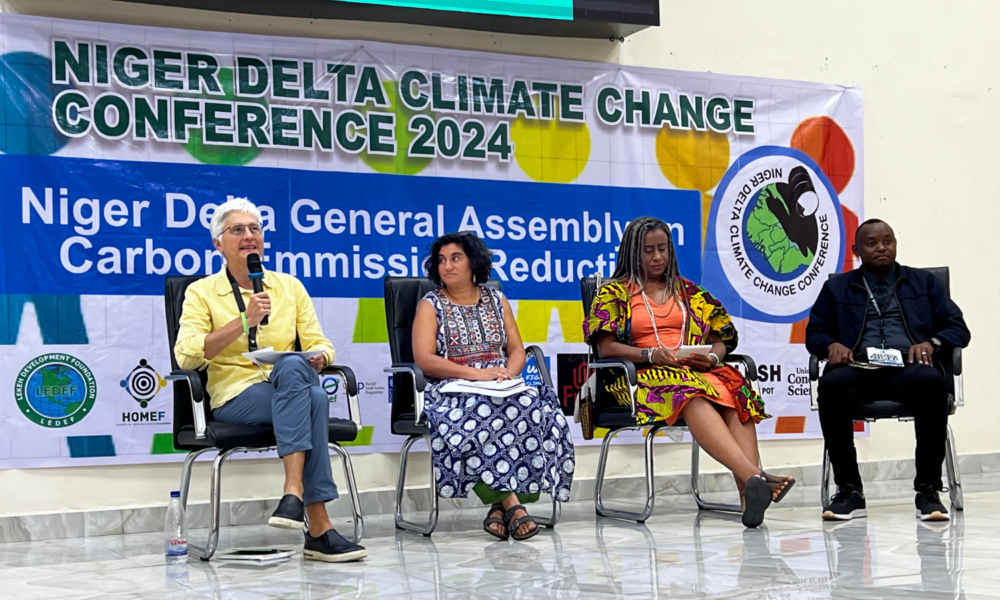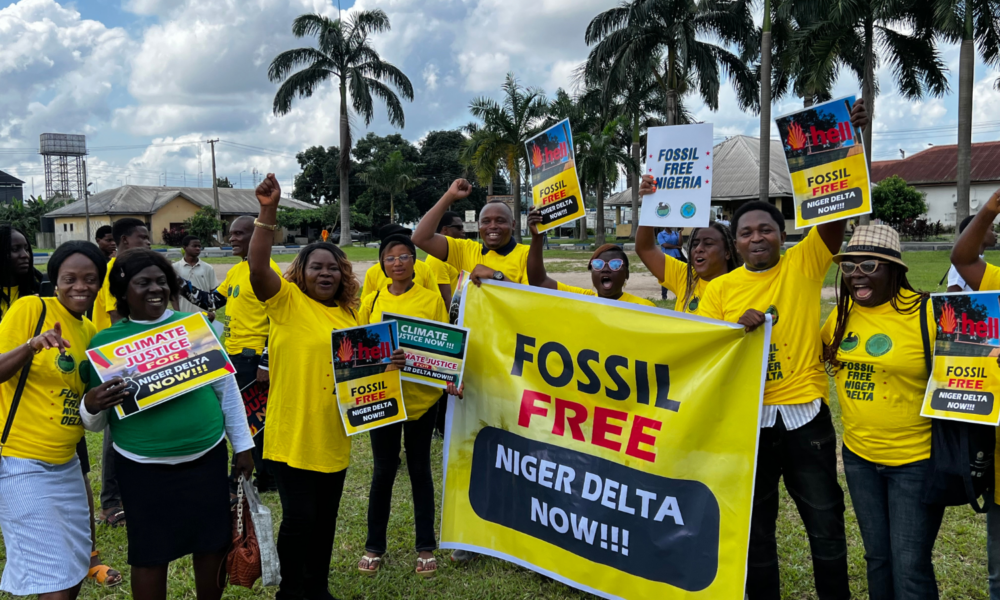After spending a week in the Niger Delta region of Nigeria, I’m now gearing up to attend the 29th meeting of the Conference of the Parties (COP29) to the Framework Convention on Climate Change in Baku, Azerbaijan, from November 11-22. I am grateful to have met and learned from people who experience on a daily basis the devastation wrought by fossil fuel production and fossil fuel-driven climate change—and who are now campaigning for a fossil-free Niger Delta.
My time in the Niger Delta deepened my commitment to work alongside Global South allies at COP29 for increased international climate finance while resisting any efforts to roll back last year’s agreement to transition away from fossil fuels. To succeed on these fronts, the nations of the world will need to keep Shell and other major fossil fuel corporations from interfering in the international climate talks and in national policies to implement global agreements made over the past decade in Paris, Glasgow, Dubai and elsewhere.
Oil and Gas: Poisoning Air, Water, Land, and People
Imagine a bathtub overflowing with crude oil. Imagine that the tap is still gushing oil. Imagine a handful of people with teaspoons desperately and diligently trying to empty the tub, while being contaminated by its contents. This is the image that came to my mind last week, during my first visit to the Niger Delta.
I took a field trip to the village of Goi, whose residents were forced to flee twenty years ago after an oil spill from a Shell pipeline poisoned the land and waters and fueled a fire that destroyed surrounding mangrove forests. Community members eventually won a lawsuit against Shell’s Nigerian subsidiary in a Dutch court, but the cleanup is slow and will take decades longer. Villagers have lost their homes, their livelihoods, and their cultural heritage.
And this is only one spill in one village. Similar disasters have affected communities across the Niger Delta region since Shell’s discovery of crude oil in commercial quantities in 1956.
Exposure to hydrocarbons in crude oil poses serious risks to human health. Chronic exposure to Polycyclic Aromatic Hydrocarbons (PAHs), in particular, can lead to cancer, cardiovascular diseases, neurological illnesses, respiratory disorders, visual and gastrointestinal ailments, and skin conditions.
A case study of the impact of oil extraction on women’s health in Otuabagi community in Bayelsa State, conducted by the Kebetkache Women Development and Resource Center, found that 100% of the 80 participating women had PAHs in their blood at levels exceeding the World Health Organization’s permissible level.
Niger Delta Climate Change Conference 2024
This was just a sliver of what I learned at the Niger Delta Climate Change Conference convened by the Lekeh Development Foundation with a range of local, national, and international partners. The Union of Concerned Scientists was proud to support the event, and I was honored to participate and offer a brief presentation on Science toward Mitigating Impacts of Climate Change in the Niger Delta.

The conference brought together representatives from local communities, grassroots leaders, civil society organizations, government officials, women’s groups, youth movements, environmental advocates, and international allies, toward the goals of advancing a just energy transition and building climate resilience.
Over the course of five days, participants heard from:
- Academic and civil society researchers documenting the impacts of oil extraction and climate change on the environment and human health.
- Organizers demanding accountability from oil corporations, including comprehensive environmental remediation, health audits, and compensation for communities before finalizing any divestment of assets in the Niger Delta.
- Advocates calling on the Nigerian government to prioritize renewable energy investments in the Niger Delta and ensure no community is left behind in its energy transition framework.
- Litigators pursuing climate justice and corporate accountability, backed by climate science and social science.
- Women and youth insisting that their perspectives, solutions, and leadership be centered in decision-making on climate change, environmental protection, and socio-economic development.
A Call for Cleanup, Climate Justice, Corporate Accountability, and a Fossil-Free Niger Delta
During the conference, participants took to the streets from the Rivers State College of Health Science and Technology to launch the Fossil-Free Niger Delta Campaign. Led by Lekeh Development Foundation, the campaign calls for an end to fossil fuel extraction in the region and resistance to any attempt to resume oil production in Ogoniland and other impacted areas.
The conference closed with a powerful communiqué urging:
- “The Government of Nigeria to prioritize environmental cleanup, enforce corporate accountability, and accelerate the transition to renewable energy.
- “International development partners and allies to provide financial and technical support for climate resilience and community-based adaptation projects.
- “Oil companies to honor their responsibility for environmental restoration and compensation before exiting the region.
- “Communities and civil society organizations to remain united, resilient, and committed to advancing climate justice and sustainable development in the Niger Delta.”
The Reality Behind Fossil Fuel Industry Greenwashing
Although few participants from this conference will be present in Baku, all of these demands are relevant to the proceedings there. And what I witnessed in the Niger Delta contrasts starkly with the image that major oil and gas corporations attempt to project in the international climate negotiations—where they showed up in force last year, with more than 2,400 fossil fuel lobbyists.
Lobbyists from Shell and other major fossil fuel corporations do not want COP29 delegates to know how they pollute the environment, drive disruptive climate change, poison people, and attempt to walk away with impunity from the mess they’ve made. Instead, they want the world to believe that they support the goals of the Paris climate agreement and that they’re aiming to achieve net zero global warming emissions by 2050.
And yet these corporations’ actions reveal they are greenwashing:
- In its latest energy transition strategy, Shell abandoned a key climate target for 2035 and weakened its 2030 emissions reduction pledge.
- BP walked back its emissions reduction target and reversed its commitment to cut back oil and gas production by 40% by 2030.
- The CEO of Occidental Petroleum, which touts its net zero strategy, said the world should only stop using oil and gas on “the day when we run out of oil and gas.”
- ExxonMobil sued its own shareholders who were seeking more ambitious climate targets.
- Leading members of the US Congress called on the US Attorney General to investigate major oil and gas corporations’ disinformation and efforts to delay climate action and the transition to clean energy.
Amplifying Demands from the Niger Delta at COP29
Under the principle of “common but differentiated responsibilities” of parties to the UN FCCC, the people of the Niger Delta and elsewhere in the Global South need financial support to cut their heat-trapping emissions, adapt to climate change, phase out fossil fuels and transition to renewable energy. COP29 is a key moment for climate finance. A commitment of $1 trillion per year in grants and grant-equivalent funding from Global North nations is needed to close the funding gap for Global South countries that have contributed the least to climate change but are bearing the brunt of its impacts. Read more in this blog by my colleague Rachel Cleetus.
Hard-hit low- and middle-income nations also need funding for loss and damage—the negative impacts of climate change that are not being avoided or cannot be avoided through mitigation and adaptation. Unfortunately, pledges to the UN FCCC Loss and Damage Fund are still a drop in the bucket compared to the billions that Global South countries need and deserve.
As people around the world suffer damaging climate impacts and the costs of delay and inaction mount, climate litigation continues to expand and evolve. Dozens of lawsuits across the United States and nearly 100 globally seek compensation from fossil fuel companies and their enablers for promulgating disinformation and/or contributing to damaging and deadly climate impacts. At COP29, government and civil society representatives must champion climate justice.
With the host country announcing a Climate Finance Action Fund to be capitalized with $1 billion in voluntary contributions from fossil fuel producing companies and oil, gas, and coal companies, government and civil society representatives at COP29 must champion climate justice over greenwashing, charity, and evasion of liability.
This is also a critical moment for the nations of the world to stick with the commitment they made at COP28 to transition away from fossil fuels. The 2024 World Energy Outlook recently released by International Energy Agency (IEA):
- Affirms that there are no new oil and gas fields or coal mines—and no additional liquefied natural gas export infrastructure—under its 1.5°C pathway.
- Emphasizes that much more action is needed for a fast and fair phase-out of fossil fuels, even though demand for oil, gas, and coal will peak by 2030. Governments must do more to ensure record growth in renewable energy is rapidly displacing fossil fuels in the system and reducing inequalities in energy access and investment.
Heading into COP29, we need to anticipate and prepare to fight attempts by the fossil fuel lobby to reverse or delay the agreement to transition away from oil, gas, and coal—or to divert resources to approaches like carbon capture and storage, carbon dioxide removal, and alternative combustion fuels that aren’t likely to play a material role in meeting 2030 targets and don’t fully reduce the environmental injustices and public health harms of fossil fuels that impose such a heavy burden on places like the Niger Delta.
As we travel to COP29, my UCS colleagues and I are determined to support and amplify the demand from our partners in the Niger Delta for the global commitment, policies, and resources needed to protect communities and secure a sustainable, just future.

